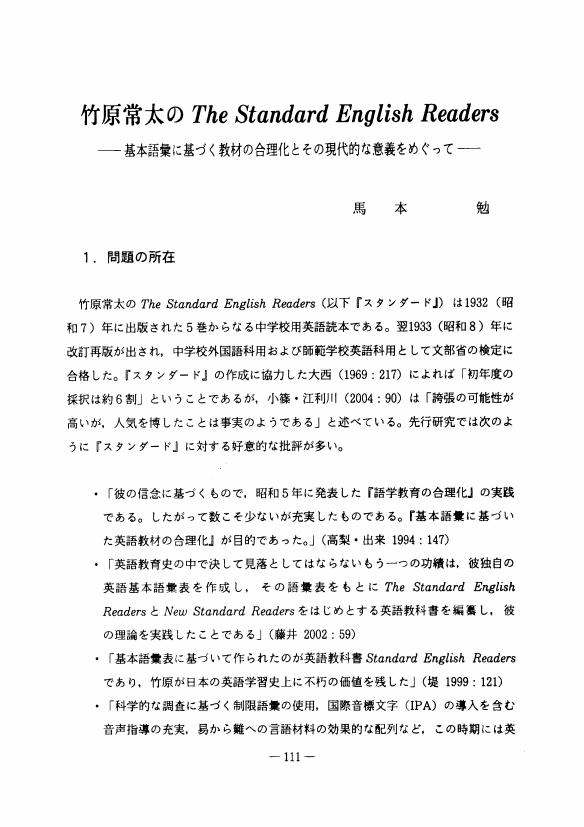- 著者
- 馬本 勉
- 出版者
- 日本英語教育史学会
- 雑誌
- 日本英語教育史研究 (ISSN:0916006X)
- 巻号頁・発行日
- vol.15, pp.51-71, 2000-05-10 (Released:2012-10-29)
- 参考文献数
- 53
1 0 0 0 メンタル・レキシコンを応用したホームページ型語彙学習ソフトの開発
本課題研究においては、語の記憶の「連鎖」とハイパーテクストにおける「リンク」の類似性に注目し、コンピュータを用いた英語の語彙学習システムの構築を行った。2年間の研究期間中、学内のWebサーバを用いて各学習者のホームページを作成し、学内外からのアクセスが可能な形で、個人個人の連想ネットワーク(擬似メンタルレキシコン)を公開した。(http://ipr.hijiyama-u.ac.jp/〜umamoto/)特に2年目の本年度は、ホームページ作成ソフトの新規導入により、Webページ作成の負担を軽減できたことが大きい。1年目の文字情報中心・学内サーバ内リンク中心のものから、映像を含むマルチメディア情報・全世界の情報網へのリンクを伴う「擬似メンタルレキシコン」の立体化が進んだように思われる。同時に学習者間のリンクも進み、他者のメンタルレキシコンとの比較も容易になった。ホームページの作成・閲覧過程を通じての「語彙力」の伸びは、多くの学習者が実感するところとなった。特に、日本語による概念の広がりをきっかけとした英語の語彙拡充の一形態が、本研究で言うところの「学習システム」において実現できたように思われる。また、学習者のメンタルレキシコンの観察を通じ、対象とする語と共に学習するのが望ましい(周辺的な)情報のあり方についても検討が進んだ。上位語・下位語・類義語などの関連語や、コロケーションなどの語法的な連想に加え、学習者の個人体験に基づく「リンク」に目を向けることにより、「語と語の連なり」「語義の広がり」「語感の深まり」といった「立体的」な語彙学習のための、語彙選定への提言を行うに至った。
- 著者
- 馬本 勉
- 出版者
- 日本英語教育史学会
- 雑誌
- 日本英語教育史研究 (ISSN:0916006X)
- 巻号頁・発行日
- vol.20, pp.111-130, 2005
- 著者
- 馬本 勉
- 出版者
- 日本英語教育史学会
- 雑誌
- 日本英語教育史研究 (ISSN:0916006X)
- 巻号頁・発行日
- vol.20, pp.111-130, 2005-05-10 (Released:2012-10-29)
- 参考文献数
- 32
1 0 0 0 OA 学習指導要領「必修語」の起源に関する一考察
- 著者
- 馬本 勉
- 出版者
- 日本英学史学会
- 雑誌
- 英学史研究 (ISSN:03869490)
- 巻号頁・発行日
- vol.2001, no.33, pp.73-86, 2000 (Released:2009-09-16)
- 参考文献数
- 50
- 被引用文献数
- 3
The Course of Study for Lower Secondary School Foreign Languages, which was revised in 1958, designated that 520 English words be included in the textbooks for junior high schools. This “compulsory vocabulary” has been criticized because the selection criterion was not clearly stated in the Course of Study.The purpose of this study, therefore, is to investigate the origin of the “compulsory vocabulary” through historical and statistical analyses.Vocabulary items for teaching purposes were traditionally selected in the following four manners : 1) Objective selection based on frequency counts of words(e.g. Thorndike's Teacher's Word Book) 2) Subjective selection based on philosophical analyses(e.g. Ogden's Basic English) 3) Empirical selection based on the intuition of experienced teachers(e.g. Palmer's The first 600 English Words) 4) Eclectic selection based on textbook-range counts(e.g. Inamura and Torii's Indispensable Words) From the comparison of the “compulsory vocabulary” with the previously published lists, it has been concluded that the compulsory list consists of widerange words used in many varying English textbooks published in Japan, as well as fundamental classroom vocabulary.

